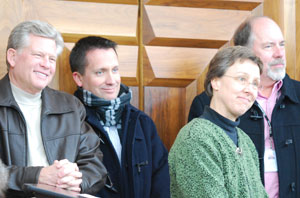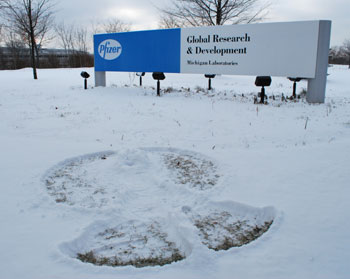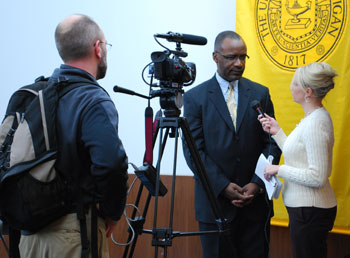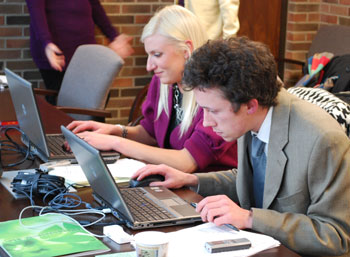UM Plans Research Hub at Former Pfizer Site
Word about the University of Michigan’s plans to buy the former Pfizer research site had leaked out much earlier in the day, but UM regents waited until the end of their regular Thursday afternoon meeting before making it formal: The university will spend $108 million to buy the roughly 174-acre Plymouth Road complex, with plans to transform it into a major medical and scientific research hub. In the long term, university officials hope to add 2,000 jobs to the local economy over 10 years. But in the short term, the deal will take millions of dollars off the tax rolls for local governments at a time when they’re already anticipating budget shortfalls.
Comments made by regents and UM executives made it clear that they’d been considering this deal for some time. Local officials were informed either last night or this morning. Several interviewed by The Chronicle said they were concerned about the added financial strain – Pfizer paid a total of $12.5 million in taxes this year to various local entities, including about $4 million to Ann Arbor alone – but they were also optimistic that the UM purchase ultimately would help the local economy.
Details of the deal
UM will pay for the property – which includes nearly 2 million square feet of lab and office space in 30 buildings – primarily from reserves of the UM Health System, particularly funds set aside by the Medical School. A smaller portion of additional funding will come from investment income typically used for capital projects. The deal is expected to close sometime this summer. It’s the university’s largest property purchase since buying 300 acres for north campus in 1950.
The university has a general vision for the area, but hasn’t decided exactly what kinds of work will take place there, said UM President Mary Sue Coleman. The property, located on the city’s north side, is surrounded by land that’s part of UM’s north campus, which includes its College of Engineering. Its massive medical complex is just south of that area. Broadly, the university will use the Pfizer complex to provide research space, possibly for cell biology, stem cell, nanotechnology and other types of medical research. UM might move entire institutes or research centers there, but precise plans are expected to take 12-18 months to develop.
Bob Kelch, CEO of the UM Health System and executive vice president for medical affairs, said the university has never had sufficient research space, a shortage that has hurt research productivity as well as recruitment. The Pfizer space will allow UM to develop more collaborative efforts, he said, both between different units within the university – such as engineering and medicine – and between the university and the private sector.
Several university officials hammered on the theme of economic development, saying that they were committed to helping the local, regional and state economy. “We’re living at the center of the economic contraction,” said Steve Forrest, vice president for research. Buying the Pfizer site sends a powerful message that the university is committed to the state, he said, and that it’s growing. Forrest added that UM plans to “aggressively” increase its partnerships with industry.
Regent Larry Deitch gave a bit of historical context for the deal, reminding the group that UM had sold Pfizer 55 acres of property for about $27 million in 2002, when Lee Bollinger was president. The university initially wasn’t interested in selling the land, Deitch said, but did so when they were told that if they didn’t, Pfizer would leave. “So we sold them the land, and they left,” he joked. But in crafting that deal, UM’s legal staff had added a clause that let UM retain rights to the land if Pfizer departed, as they eventually did. Deitch praised the staff for their foresight in that decision.

From left: Washtenaw County commissioner Mark Ouimet, Ann Arbor city councilmembers Leigh Greden and Margie Teall, and city administrator Roger Fraser watch as the regents discuss their decision to buy Pfizer property.
Local impact
Because the deal won’t likely close until mid-2009, Pfizer will still pay local taxes on the site next year. That gives local officials some breathing room as they face the loss of their largest taxpayer. (As a public institution, UM does not pay taxes.)
Of the $12.5 million in total local taxes paid by Pfizer in 2008, about $1.3 million went to county coffers. Washtenaw County prepares its budgets on a two-year cycle, and will begin looking at the 2010-11 budget early next year. The county had already projected lower revenues from a weak housing market that has dropped property taxes, “so now this is added to the mix,” said county administrator Bob Guenzel, who attended Thursday’s regents meeting. Pfizer taxes account for about 1% of the county’s $107 million annual budget.
Yet Guenzel said despite the challenge, he has confidence that UM is making economic development a priority, and that the purchase will pay off for the community in the long run. Guenzel also serves on the board of Ann Arbor Spark, the local economic development agency that’s been helping Pfizer shop the site around to potential buyers. He said he was informed of the purchase on Thursday morning, when he got a phone call from Jim Kosteva, UM’s director of community relations.
John Hieftje, Ann Arbor’s mayor, recently had coffee with Coleman but didn’t hear about the Pfizer deal until she called him Wednesday night. In 2008, taxes from Pfizer represented 4.85% of the total property taxes collected by the city. But Hieftje, too, believes the purchase will be good for the overall economy, especially if the jobs that UM hopes to add actually materialize.
Responding to a question from a Michigan Radio reporter, Coleman said the university would have been happy if another buyer had come forward for the property. When Pfizer announced it was closing its Ann Arbor operation two years ago, she had been hesitant to pursue the property, in part because of concerns over the tax implications for the community. But the economy changed over that period, she said, making other buyers scarce. And as the university looked more closely at the property, they realized it was a better fit than they’d originally envisioned.
As the university’s research agenda and capacity increases due to the expansion into Pfizer’s site, they expect to hire more faculty, post-doctorate researchers and research staff, Coleman said. Those higher-paying jobs will benefit the economy, she said, noting that the same is true for jobs created as the result of partnerships with the private sector.
“And if we really cram people in there,” Coleman said, “maybe we can hire 4,000 people.”
Media coverage
Regents meetings normally don’t draw a lot of media attention, but UM put out a press release Thursday morning saying there’d be a “major announcement” at the meeting, and several news outlets, including The Chronicle, reported that the purchase of Pfizer’s research campus was on the table. So Thursday’s meeting was well attended by print, radio and TV reporters.
During the meeting, Regent Andi Fischer Newman apologized to Ann Arbor News reporter Dave Gershman, saying that he’d emailed her on Wednesday asking if the announcement was on Thursday’s agenda and she told him no – but what she didn’t say was “not at this time.”
Other news reports: Ann Arbor News, Ann Arbor Business Review, Detroit Free Press, Detroit News, Crain’s Detroit Business, Michigan Radio










So:
1. How can UM as a public institution have budget for such a purchase while also raising tuition rates to their students? It would seem UM doesn’t feel teaching the public is their core business.
2. What is Ann Arbor going to do to reduce the budget in adjustment for this lose of tax base?
It would be nice to see UM step up and help fill the enormous philanthropic gap left with Pfizer’s departure. We all know they don’t pay taxes but there are other universities that do more to help their surrounding community than UM has. I can envision a variety of ways not all requiring large outlays of cash in which the U could help the area.
The purchase of the Pfizer space and the possibility of 2000 jobs in the future is not comforting to those recently fired by the hospital and it’s IT department, MCIT.
Kris,
You answered your own question in the first sentence.
All,
While I have wanted to throw a thing or two at Pfizer, throwing myself into the snow to make as now angel never occurred to me. I’m surprised their security guards didn’t run right out at the person and yell for them to get off their property. I work in a building next to one of the Pfizers and have been yelled it for trying to take a shortcut across their lawn.
Joan you too! But in all fairness to the University…MSC is doing a great job with the stadium, football team and keeping ethics in research right? It fits in perfectly with her plan to turn this into the Peoples Republic of Ann Arbor. If I was Pfizer I would have left to who wants neighbors like MSC…she really doesn’t want you on HER lawn.